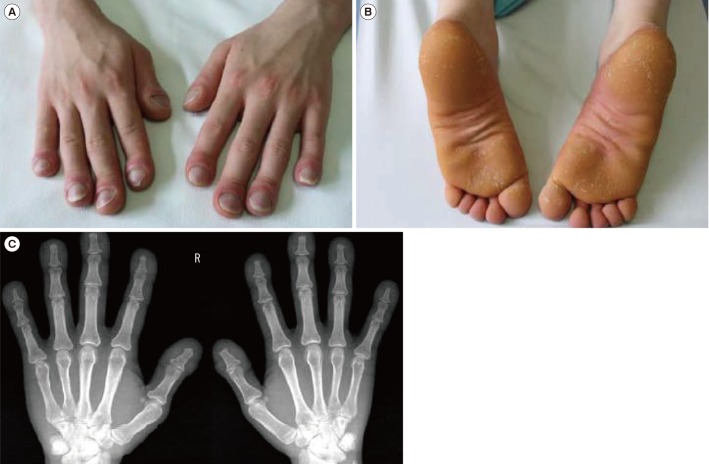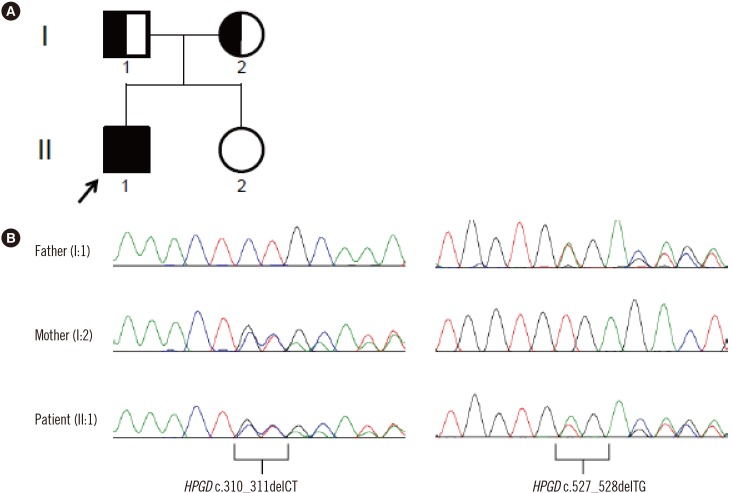Ann Lab Med.
2019 Jan;39(1):105-108. 10.3343/alm.2019.39.1.105.
Compound Heterozygous Pathogenic Variants of the 15-Hydroxyprostaglandin Dehydrogenase Gene in a Patient With Hypertrophic Osteoarthropathy: First Case in Korea
- Affiliations
-
- 1Department of Laboratory Medicine and Genetics, Samsung Medical Center, Sungkyunkwan University School of Medicine, Seoul, Korea.
- 2Division of Cardiology, Department of Internal Medicine, Korea Association of Health Promotion, Seoul, Korea. cozy14@gmail.com
- 3Department of Endocrinology and Metabolism, Kyung Hee University School of Medicine, Seoul, Korea.
- 4Division of Molecular Genetics, Department of Laboratory Medicine, Seoul Clinical Laboratories, Yongin, Korea.
- 5Green Cross Genome, Yongin, Korea. changski.md@gmail.com
- KMID: 2420281
- DOI: http://doi.org/10.3343/alm.2019.39.1.105
Abstract
- No abstract available.
MeSH Terms
Figure
Reference
-
1. Castori M, Sinibaldi L, Mingarelli R, Lachman RS, Rimoin DL, Dallapiccola B. Pachydermoperiostosis: an update. Clin Genet. 2005; 68:477–486. PMID: 16283874.2. Zhang Z, Xia W, He J, Zhang Z, Ke Y, Yue H, et al. Exome sequencing identifies SLCO2A1 mutations as a cause of primary hypertrophic osteoarthropathy. Am J Hum Genet. 2012; 90:125–132. PMID: 22197487.3. Uppal S, Diggle CP, Carr IM, Fishwick CW, Ahmed M, Ibrahim GH, et al. Mutations in 15-hydroxyprostaglandin dehydrogenase cause primary hypertrophic osteoarthropathy. Nat Genet. 2008; 40:789–793. PMID: 18500342.4. Li SS, He JW, Fu WZ, Liu YJ, Hu YQ, Zhang ZL. Clinical, biochemical, and genetic features of 41 Han Chinese families with primary hypertrophic osteoarthropathy, and their therapeutic response to etoricoxib: results from a six-month prospective clinical intervention. J Bone Miner Res. 2017; 32:1659–1666. PMID: 28425581.5. Kim HJ, Koo KY, Shin DY, Kim DY, Lee JS, Lee MG. Complete form of pachydermoperiostosis with SLCO2A1 gene mutation in a Korean family. J Dermatol. 2015; 42:655–657. PMID: 25810087.6. Lee S, Park SY, Kwon HJ, Lee CH, Kim OH, Rhee Y. Identification of the mutations in the prostaglandin transporter gene, SLCO2A1 and clinical characterization in Korean patients with pachydermoperiostosis. J Korean Med Sci. 2016; 31:735–742. PMID: 27134495.7. Tüysüz B, Yilmaz S, Kasapcopur Ö, Erener-Ercan T, Ceyhun E, Bilguvar K, et al. Primary hypertrophic osteoarthropathy caused by homozygous deletion in HPGD gene in a family: changing clinical and radiological findings with long-term follow-up. Rheumatol Int. 2014; 34:1539–1544. PMID: 24816859.8. Erken E, Köroğlu Ç, Yildiz F, Özer HT, Gülek B, Tolun A. A novel recessive 15-hydroxyprostaglandin dehydrogenase mutation in a family with primary hypertrophic osteoarthropathy. Mod Rheumatol. 2015; 25:315–321. PMID: 24533558.9. Yuan L, Chen L, Liao RX, Lin YY, Jiang Y, Wang O, et al. A common mutation and a novel mutation in the HPGD gene in nine patients with primary hypertrophic osteoarthropathy. Calcif Tissue Int. 2015; 97:336–342. PMID: 26135126.10. Richards S, Aziz N, Bale S, Bick D, Das S, Gastier-Foster J, et al. Standards and guidelines for the interpretation of sequence variants: a joint consensus recommendation of the American College of Medical Genetics and Genomics and the Association for Molecular Pathology. Genet Med. 2015; 17:405–424. PMID: 25741868.
- Full Text Links
- Actions
-
Cited
- CITED
-
- Close
- Share
- Similar articles
-
- Identification of the Mutations in the Prostaglandin Transporter Gene, SLCO2A1 and Clinical Characterization in Korean Patients with Pachydermoperiostosis
- Primary hypertrophic osteoarthropathy accompanied by Crohn's disease: a case report
- Idiopathic Hypertrophic Osteoarthropathy: Case Report
- A Case of Hypertrophic Osteoarthropathy Associated with Nasopharyngeal Carcinoma in a Child
- A Compound Heterozygous Pathogenic Variant in B4GALNT1 Is Associated With Axonal Charcot-Marie-Tooth Disease



